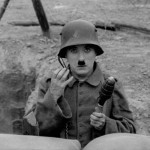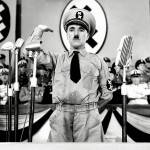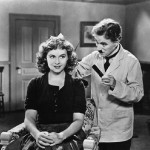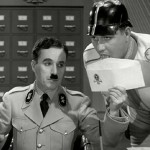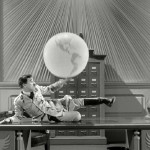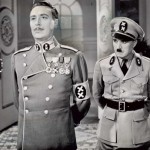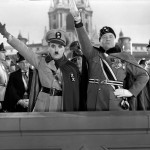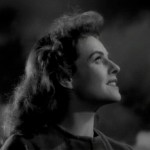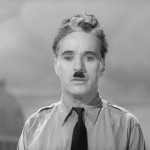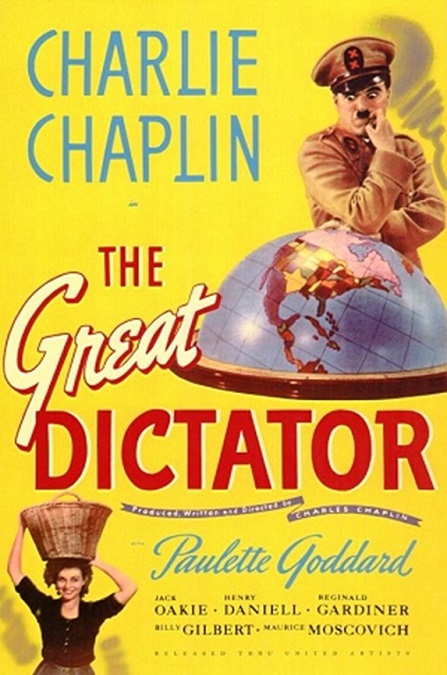
The Great Dictator – 1940
This was a remarkable and important film on a number of levels. It was the heavily political nature of the film and its complete lack of subtlety that was the key to its success. It is billed as a comedy/drama starring, written, produced, scored and directed by Charlie Chaplin. It is also notable that this was Chaplin’s first talking film, which surprised me because it was made in 1940. Talkies had become the norm in the late 1920s, so what was Chaplin doing making silent films for over ten years after they had gone out of fashion?
The film was an obvious parody of Adolf Hitler and the Nazi Regime. But it was rather unique as a Best Picture nominee. It was a comedy. But it wasn’t just any kind of comedy. By today’s standards, it was like a combination of several well-known styles: The Three Stooges, Chaplin’s silent films, of course, Monty Python, and a healthy dose of the Zucker Brothers. It had some really funny moments that had me laughing out loud.
Chaplin played two characters, the Jewish Barber and The Phooey (Furher), Adenoid Hynkel. I’ll start with the Barber. The character has often been compared to Chaplin’s immensely famous character from his silent films, The Tramp. There has actually been some debate as to whether or not the character was The Tramp, or at least a version of him. Chaplin denied that they were the same, but the similarities are hard to ignore. They each had the same look and even some of the same mannerisms. The Barber is a bumbling soldier fighting for the Central Powers during WWI. He saves the life of a Tomanian soldier, Commander Schultz, played by Reginald Gardiner. After doing so, he develops amnesia for ten years.
The Barber’s love interest is Hannah, a Jewish washer-woman, played by Chaplin’s wife, Paulette Goddard. On the one hand, she was sweet and shy, but on the other, she was not afraid to fight the Storm Troopers oppressing her people. She was very pretty and did a good job.
Adenoid Hynkel is the Tomanian dictator who goes out of his way to oppress the Jews. Chaplin portrayed Hynkel as a complete buffoon. In remarkably accurate Hitler style, he gives fiery speeches to his cheering supporters. Most of what he actually says is gibberish which is punctuated with recognizable words like wenerschnitzel, sauerkraut, Leberwurst, and blitzkrieg. From what I have read, these speeches were improvised by Chaplin.
In particular, there was a fantastic scene in which Hynkel dances to the Overture of Wagner’s Lohengrin with a balloon globe, which he tosses and spins on his finger. The dance is elaborate and flamboyant. It is representative of his fantasy about being the dictator of the world. At the end of the dance, the balloon pops in his hands.
In a surprisingly memorable performance, Jack Oakie plays Hynkel’s rival, Benzino Napoloni, Dictator of Bacteria. This was an obvious parody of Mussolini. The comic scene between the two tyrants that ended in a food-fight over who got to invade and conquer the neighboring country of Osterlich was particularly funny.
The film and Chaplin’s portrayal of Hynkel was incredibly bold. He was openly making fun of one of history’s greatest monsters before much of the world believed that he was a monster. America didn’t even get involved in WWII until 1941. Many people knew of the Nazis but didn’t believe that they represented any real kind of threat. Chaplin’s film was his attempt to raise public awareness. He was encouraged by President Roosevelt to make the film as propaganda. And like I said, there were some very funny moments.
But at the end of the film, all thoughts of comedy were abandoned. Because of their similar looks, the Jewish Barber and Hynkel are mistaken for each other. Hynkel is arrested by his own Storm Troopers and the Barber is made to give a speech to the masses. Chaplin speaks directly to the people of the world in a 5 or 6 minute speech, telling them not to give in to the tyrants and dictators of the world. He says that love and kindness toward ones fellow men is a goal to be strived for. It was actually a very bold statement at a very dangerous time in the world’s history.
